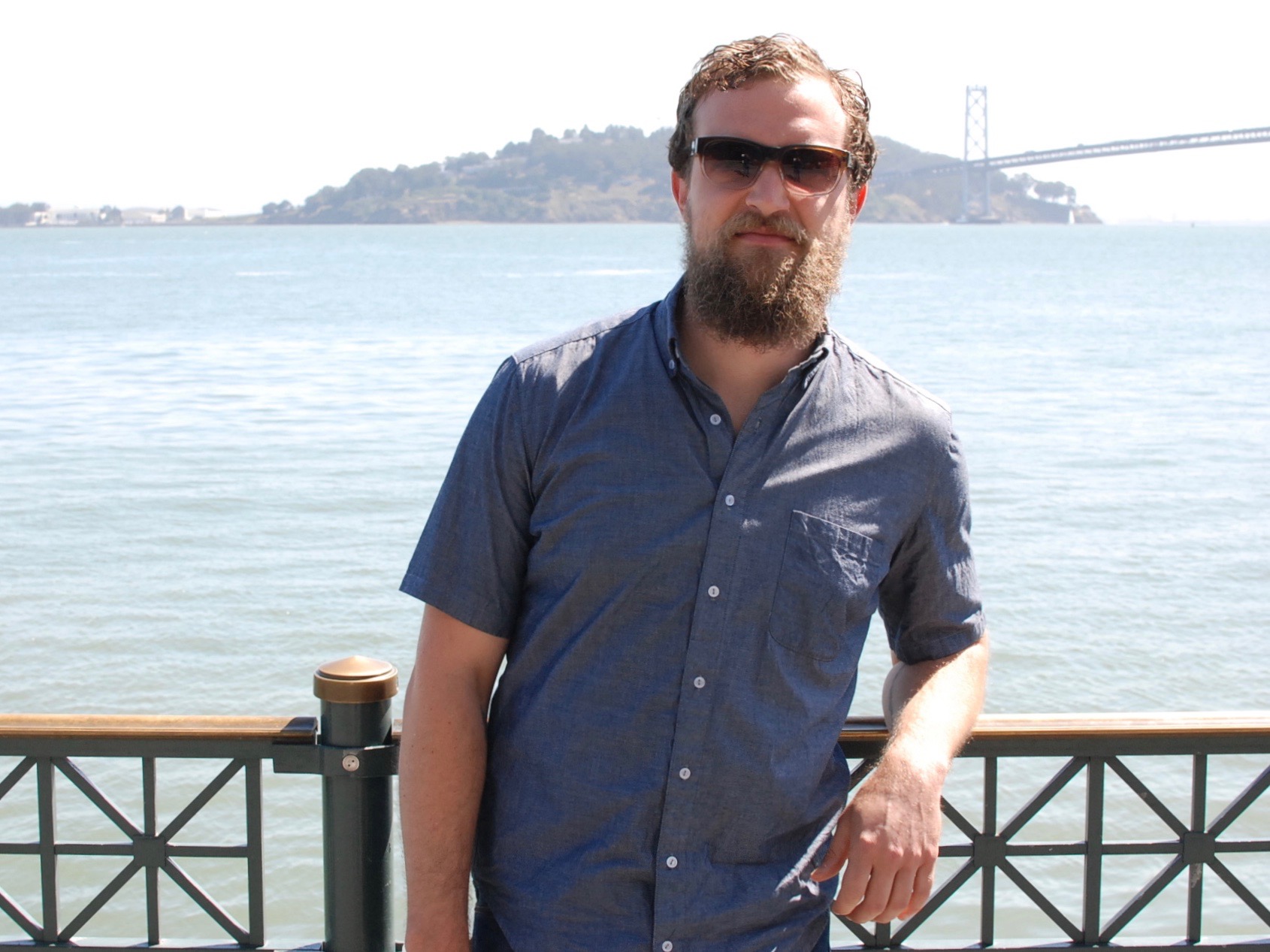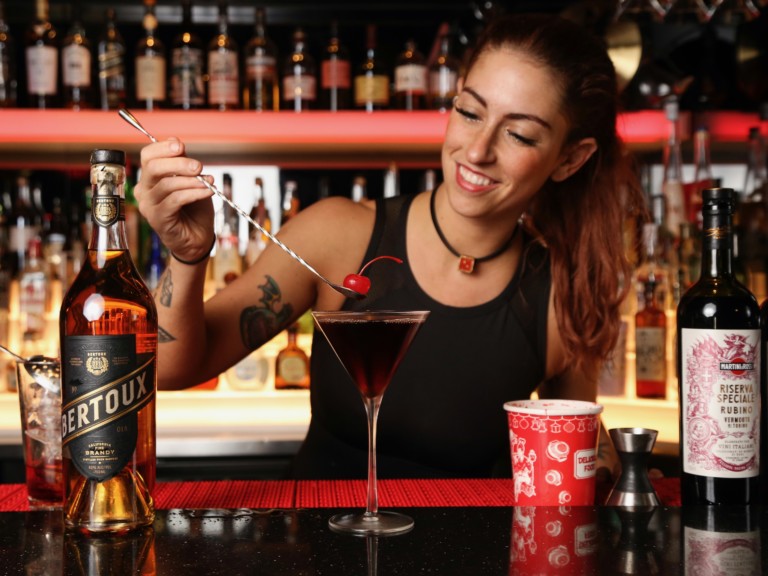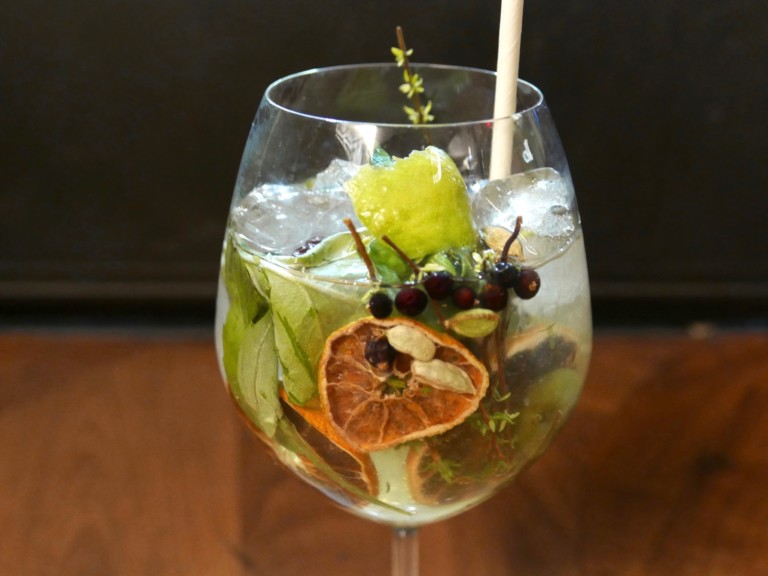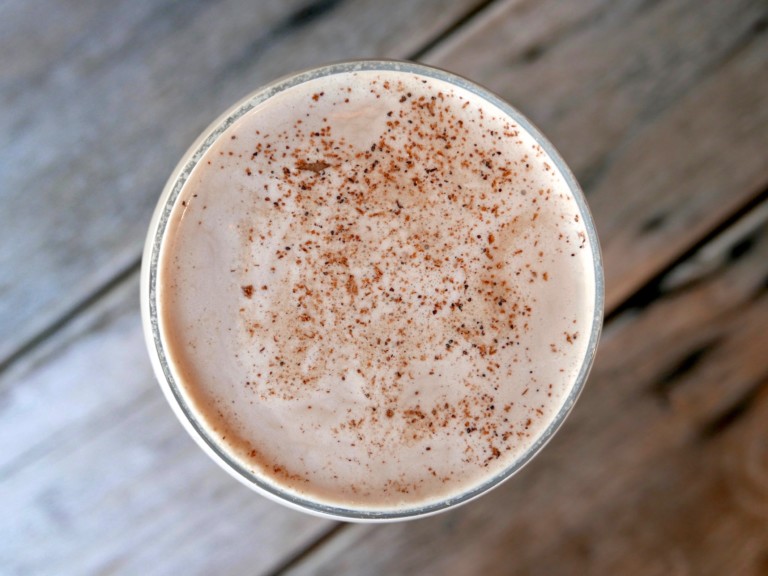Dylan William O’Brien has been a busy man. The longtime bartender returned from from a wine-centric hiatus and now co-owns Bloodhound in SoMa and Churchill in the Castro. He’s also working to open Prizefighter in Emeryville, the land of Pixar. On July 5, we met at Il Cane Rosso, where O’Brien better explained his background and approach.
How are you able to maintain a balance in your life?
That’s a good question. It’s a work in progress. I guess one thing about bartending is it’s kind of a social endeavor. You’re around people and you’re working. It’s stressful and it’s work and it’s intense. You still get a lot of human interaction during downtime on your shift. I spend a lot of time at home when I’m not at the bar. I try and balance that out.
Just taking it easy?
As easy as I can. I’ve got a lot of projects going right now. It’s nice not to do anything when you don’t have to do something.
How would you say Churchill differs from Bloodhound?
It’s been more cocktail focused. When Bloodhound opened, it wasn’t very heralded, kind of opened in an out of the way neighborhood. I knew a lot of people in the cocktail community personally, but it wasn’t the kind of thing where we promoted and it was going to make a big splash on the San Francisco scene. We kind of opened and just kind of grew organically. Over time, people could appreciate that we had a good program. You’d get a nice spirits selection, a nice whiskey selection, you could get a nice cocktail here and there, and we became appreciated for that. It just sort of grew organically. Whereas Churchill there was a lot more hype about it coming in, everything about our reputation for cocktails was put out on blogs and all the new media stuff. Right off the bat it was cocktail, cocktail, cocktail. 85% was cocktails, whereas at Bloodhound we do lots of beers, we do lots of neat spirits, we do a little bit of everything, whereas this was cocktail-heavy to start.
Who are your partners and how did you end up teaming up with them?
My partners in Bloodhound are a guy named Darin Brunson. He and I used to bartend together in Berkeley and later in San Francisco. He’s an old friend. My other partner Mike [Goebel] is a guy who’s involved in a number of projects throughout the city. He and Darin own a bar in the Mission called Double Dutch. I was working in the wine business in San Francisco. I took a break from bartending, actually, when I turned 30. I decided I needed to try something else. 30 being this major birthday. It’s not, but I was in the wine business for a year and a half and I totally hated it. I was just really miserable, and I used to take the BART back to the East Bay and I’d walk to Darin’s bar and just drown my sorrows after work and talk about how miserable it was working for a corporation…Finally one day he said, “You know, we’re getting ready to open another bar. This is what you do, this is what you’re good at. This is what you want to do. Quit doing this wine nonsense and let’s open a bar together.” So we did.
What was your very first cocktail memory?
I don’t know if I have a first cocktail memory. My first spirit memory, my next door neighbor poured me a glass of vodka when I was about seven, and I didn’t know what it was. It was clear, and I remember drinking it, and I think I ran directly back to my mom’s house and was like, crying, because it was burning in my mouth.
My first cocktail memory? That’s a good question. I didn’t really come to appreciate cocktails until later on. I worked in restaurants, and I was always really into beer. I wasn’t much into spirits until my early 20’s. I guess when I started bartending, is when I became acutely aware of it.
What was your first bar job?
It was in Spain. I lived in Sevilla, I was studying abroad, I was studying Spanish. I pretty much ran out of money. It was a bar called Pancho’s. It was a Mexican restaurant in Spain, and they needed somebody who spoke Spanish and knew how to bartend. I didn’t know how to do either of those things, but I convinced them that I did. I had a good accent at least, so what I was lacking in my vocabulary I could make up for with B.S.’ing my accent. I started bartending there, and when I came back here, I started bartending at a place in Berkeley called Café Rouge.
What was the progression from that to wine?
Well, I started working at Cesar in Berkeley, which is next door to Chez Panisse, which since the beginning has had a very progressive spirits program. They were one of the first places to have 40 scotches and 30 rums and an extensive, well-selected list of spirits, which now has become prominent, but it was novel in the late ’90s, early 2000s. I started working there with Dennis Lapuyade, who was the owner and wine buyer. I started sitting in with him on his buying tastings. So we’d get to taste anywhere from 50 to 100 wines, once a day, every week, just get exposed to a huge array of things. That’s really where I cut my teeth and really where I got passionate about wine and spirits.
Would you consider Dennis Lapuyade a mentor?
Absolutely. I learned so much from him.
Anybody else along the one who’s really helped you develop as a professional?
Yeah. There’s a guy named Desmond [Allen] who is the bar manager at Café Rouge. That was my first kind of real bartending gig. He was an old Irish bartender that just had a wonderful, great personality at the bar. I learned a lot about customer service and what it meant to be a bartender and not a drink maker, how to sort of entertain people and show them a good time, little tricks you could do to make people smile, have them come back, have them remember your name, that kind of thing, above and beyond making great drinks. Giving people a show when they actually sat down at the bar. Giving people a reason to sit at the bar instead of sitting in the dining room.
What are a couple tips that you would give people to endear yourself to customers?
This maybe isn’t the question that you’re asking me, but one of my big gripes about sort of the way the bar scene has evolved, sort of the mixology scene, is that customer service so many times is completely forgotten. There’s this attitude that I have my shirt garters and my pageboy cap and my suspenders, and I’m making this obscure cocktail with perfect ice poured into vintage barware. Whatever. I’m doing you a favor by doing that for you. That’s not what it’s about. It’s not at all, actually. The customer’s doing you a favor by coming in, buying your product and tipping you for it. I think just be friendly, be friendly, be present. Talking to somebody when it’s the right time, leaving them alone when it’s the right time, making eye contact, remembering people’s names, or at the very least remembering their face and what they drink. Chances are somebody’s sat in my bar and drank for any length of time, I’ll remember them when they come back. If I can remember what they drank or what we talked about, it blows people away. People love that, because people love being recognized. You forget that sometimes, because you’re a bartender, people always recognize you. You’re on stage, you’re behind a bar, but the average customer who walks into a bar maybe works in a cubicle office, so for them to be recognized by someone is a good feeling. Whatever that small personal connection is that you can make.
What do you look for when you’re hiring somebody to work behind one of your bars?









Blog Comments
Sheila Dale
August 8, 2011 at 2:29 PM
I so enjoyed reading this. It was at once informative and tantalizing. The enthusiasm for quality and the cocktail as art enticed me. Good interview with a bartender whose taste is sophisticated,excited and, seemingly, without borders. Great!
Joshua Lurie
August 8, 2011 at 9:30 PM
Sheila,
Dylan came across well during our in-person interview, and I finally had a chance to try one of his cocktails on Saturday at Bloodhound. The next time you’re there, if you like spirit-forward drinks, ask him for a Boulevardier.